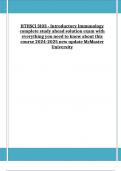Exam (elaborations)
HTHSCI 3I03 - Introductory Immunology complete study ahead solution exam with everything you need to know about this course new update McMaster University
- Course
- Institution
HTHSCI 3I03 - Introductory Immunology complete study ahead solution exam with everything you need to know about this course new update McMaster University
[Show more]



